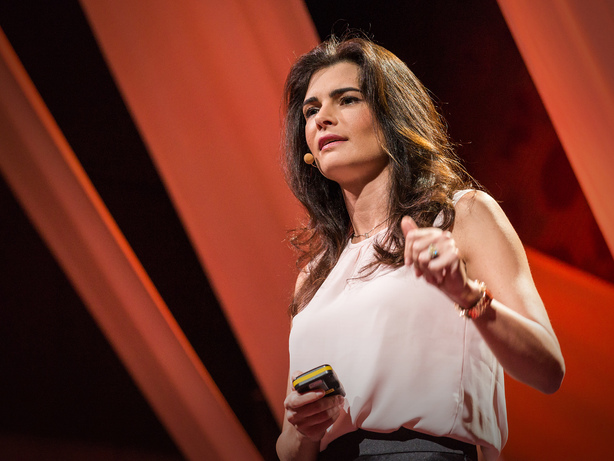"Mom, who are these people?"
“媽媽,這些人是誰?”
It was an innocent question from my young daughter Alia around the time when she was three.
這是來自我小女兒Alia的天真的疑問,大概是在她三歲的時候。
We were walking along with my husband in one of Abu Dhabi's big fancy malls.
我們正與我丈夫走在一塊,在阿布扎比的某一間大型豪華購物中心中。
Alia was peering at a huge poster Alia standing tall in the middle of the mall.
仔細端詳著立在購物中心中央的巨幅海報。
It featured the three rulers of the United Arab Emirates.
它標示著三位阿拉伯聯合酋長國的統治者。
As she tucked in my side,
當她拽著我的衣角,
I bent down and explained that these were the rulers of the UAE
我彎下身然后描述著這就是阿拉伯聯合酋長國的統治者,
who had worked hard to develop their nation and preserve its unity.
他們很努力地發展他們的國家,保持他們的團結性。

She asked, "Mom, why is it that here where we live,
她問說:“媽媽,為什么這里,我們住的地方,
and back in Lebanon, where grandma and grandpa live,
和黎巴嫩,爺爺跟奶奶住的地方,
we never see the pictures of powerful women on the walls?
我們從沒有看過在墻上有厲害的女人的圖片?
Is it because women are not important?"
這是因為女人不重要嗎?”
This is probably the hardest question I've had to answer in my years as a parent
這大概是我身為父母以及16年多的職業生涯中
and in my 16-plus years of professional life, for that matter.
曾回答過的最困難的問題了。
I had grown up in my hometown in Lebanon,
我在我的家鄉黎巴嫩(Lebanon)長大,
the younger of two daughters to a very hard-working pilot
是兩個女兒中的小女兒,父親是努力工作的飛行員,
and director of operations for the Lebanese Airlines
同時也是黎巴嫩航空的操作總監。
and a super-supportive stay-at-home mom and grandma.
有個超級顧家的母親與祖母。
My father had encouraged my sister and I to pursue our education
我的父親很鼓勵我們求學,
even though our culture emphasized at the time
即使我們的文化,特別強調在那個時間點,
that it was sons and not daughters who should be professionally motivated.
那是只有兒子而不是女兒應該要被啟發的(職業積極性)。
I was one of very few girls of my generation who left home at 18 to study abroad.
我是在我那個年代極少數女孩的其中一個在18歲離開家出國念書。
My father didn't have a son, and so I, in a sense, became his.
我的父親沒有兒子,所以,在某種意義上來說,我變成了兒子。
Fast-forward a couple of decades, and I hope I didn't do too badly in making my father proud of his would-be son.
快轉數十年,我希望我沒有做得太差,在讓我父親以他試圖打造的“兒子”為傲的方面。











